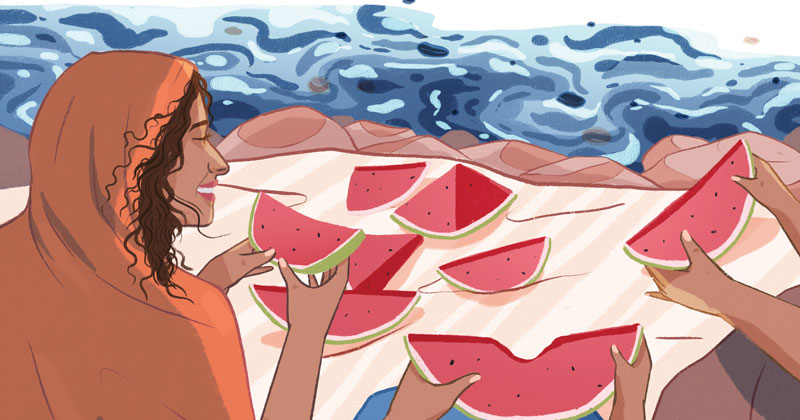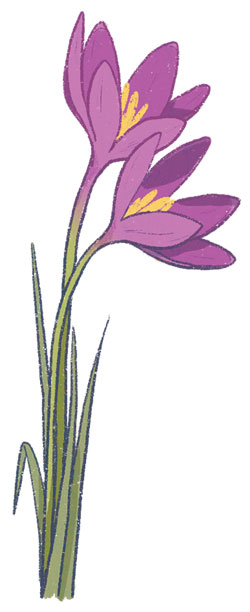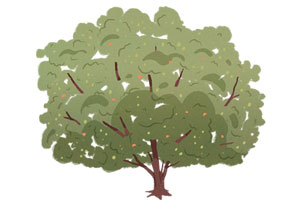


Longing for peace
September 02, 2022
Ferwadin Serat can still taste the fresh watermelon she shared with her sister on the embankment of the Kokcha River. She can still picture the snapping fish that chased them out of the water. And she can still hear their laughter, rising above the rapids.
It is one of many fond memories Serat carries from her days growing up in this river valley, surrounded by fields of saffron, fruit trees and roaming livestock on her family’s land, roughly the size of the UD campus. The recollections bring a sense of inner peace, which, coincidentally, is said to be a side effect of lapis lazuli, the precious, celestial-blue stones mined from this fertile earth for thousands of years.
But not even magical stones can ward off evil.
For the 20 years that the U.S. occupied Afghanistan, Serat’s northern province withstood violent attacks from the Taliban. The evenings brought a cacophony of mortar shelling that drowned the sounds of the river. In the mornings, Serat braced for the insurgents who regularly climbed onto the roof of her school building to protest the rights of girls receiving an education. Due to overcrowding, she endured these disturbances from inside an adjacent tent that served as a makeshift classroom, often hiding under a table with fellow pupils or abandoning written examinations to flee to safety when the shouting turned menacing.
Sometimes, I feel like I'm 80 years old because of everything I've experienced.

The war took a toll on Serat’s family. A relative had been forced to marry a Taliban soldier at the age of 17. Then there was the beloved 22-year-old cousin killed by a bomb at his Afghan university in 2016. She learned about his death while watching news broadcasts, a cherished ritual that provided a conduit to the world outside her mountain-ringed province. In her grief, Serat feared a similar fate, but she clung to hope.
“I still had belief in my future,” she says. “I still dreamed of what my life could be.”
Serat persisted with her lessons in the tent, getting soaked during the rainy season and nearly passing out in the summer heat, her requisite burqa making the latter especially difficult to endure. Upon graduation, she became the only one of her peers to enter a university, studying in a less remote part of the same province. But when she returned years later, a college graduate with a degree in literature, the realities of her conservative region set in. As a woman, her work options were severely restricted.
Fortunately, Serat’s parents were relatively progressive. Her mother had also managed to obtain a university degree, and she served as a teacher while secretly dreaming of life as a performer. Around the house and garden, she sang the lyrics of Farhad Darya, a formerly exiled music composer and peace activist considered the Elvis of Afghanistan. Serat’s father, meanwhile, worked for the government’s agricultural sector, teaching members of the community how to tend their land. He enjoyed his career but, when he saw his daughter consumed by sadness over her limited post-college prospects, he decided to move all five of his children, aged 14 to 24, to the more contemporary capital city of Kabul.
I told my boss I was coming back to work, but he said, "Do you want to die? Women can no longer enter. Men with guns are standing outside the door."
Even 12 hours removed from their province, the family could not escape war. Sporadic bombings executed by Taliban insurgents prevented Serat from ever fully exhaling. A music fan like her mother, she considered taking advantage of a nearby guitar class but worried that such a gathering would attract militants looking to make an example of progressive young women who dared sing in public. “Always, there was fear in my heart,” she says.
Even so, Serat relished other aspects of her new life, like trading in her burqa for jeans and a smaller head scarf. She also found a rewarding job within the government’s energy sector and, for one year, she basked in the feeling of a long-but-fulfilling day at work. The aromatic rice in her family’s kabli pulao dish tasted somehow better knowing that her income had helped purchase the ingredients.
This brush with empowerment left Serat wanting more. Following the lead of an older sister, she and another sibling applied for scholarships to Bangladesh’s Asian University for Women (AUW). With the COVID-19 pandemic raging, all three women were admitted, and they waited patiently for a return to normalcy so they could seize this ticket out of Afghanistan.
Their departure came sooner than expected.
When the Taliban wrested control of Kabul in August 2021, Serat watched from a window in her family’s ninth-story apartment as her street descended into chaos. Neighbors ran from the encroaching insurgents, and two people just behind her building were killed. From her television set, a BBC news anchor narrated the unfolding nightmare, and she learned that her president had fled the country. Deep within the Arg, Kabul’s presidential palace, men with automatic weapons slung over their arms snapped iPhone photos of one another sitting behind the former leader’s ornate wooden desk.
“It was like being in hell,” she says. “I thought: ‘This is it. Everything is finished’.”
It was like being in hell. I thought, "This is it. Everything is finished."
Serat held her breath as, one by one, her mother and siblings returned from their respective jobs, having survived the pandemonium. She watched her 14-year-old sister run home from school in tears, knowing she might never set foot in another classroom. Her father paced the room, voicing the worry that regularly kept him awake at night: “What will I do if the Taliban forces one of my daughters into marriage?”
After one hour, the street turned eerily quiet. Serat’s home had lost power and water, outages that would last weeks. The female siblings spent the following days sleeping and crying, losing track of the hours as they retreated from the world.
“I felt sick,” Serat says. “Every thought, every word, every social media post — it was all about the Taliban. I called my boss and told him I was coming back to work, but he said, ‘Do you want to die? Women can no longer enter. Men with guns are standing outside the door’.”
Her parents tried to console her—“We’ve lived this life before; we can do it again”— but, for Serat, there could be no going back to a time when laughing in the street might result in death. Instead, she and her two college-bound siblings decided to risk the escape plan conceived by AUW peers, with help from school officials who’d been coordinating with U.S. military on the ground.
After an emotional goodbye to their family, the sisters boarded one of seven chartered busses to the airport. As they circled the grounds for four days, desperate strangers approached their vehicle, hoping for their own shot at a flight out, but the driver turned them away. In the middle of the night, when Serat’s mother texted for updates, she had to cut off contact—she could not risk light from her cell phone illuminating her face and drawing the attention of passing militants.
Most of us are just like you. We want a life without risk. We want freedom. Most of all, we want peace.

Eventually, they made it to an airport checkpoint, where a member of the Taliban asked a designated student leader to hand over a list of passengers. But, with shaking hands, this woman failed to produce the information quickly enough. The man told the students to get lost—they had wasted his time. For a moment, Serat and saw her future crumble before her eyes. But neither she nor any of the other women moved; they had not come this far to turn around. After a pleading intervention from the leader of another bus, the exasperated Taliban finally waved the students through.
“You cannot imagine what it is like to be face to face with one of them until it happens to you,” Serat says. “It’s indescribable.”
After a flight to Saudi Arabia, then Spain and finally Wisconsin’s Fort McCoy, a U.S. Army installation where the women spent four uncertain months, Serta is now at UD, working toward a degree in international relations. She dreams of becoming a U.N. ambassador with power to advocate for her country.
“I want to change minds,” she says. “When people ask me where I am from and I answer Afghanistan, I can read the words behind their eyes. They think maybe we are all terrorists, or that we come from a no-good place. But most of us are just like you. We want a life without risk. We want freedom. Most of all, we want peace.”
While one of Serat’s sisters is studying at New York’s Cornell University, the other has become a fellow Blue Hen. Together, the women explore UD’s campus, where they are continually taken aback by the almost pathological optimism of the student body. It’s a mentality that has rubbed off on Serat, whose water bottle bears a “Life is good” sticker.
With friends at home, we would talk only about our problems. But here, I see students discussing their futures and their hopes. I realize that I can be happy.
“Sometimes, I feel like I’m 80 years old because of everything I’ve experienced,” she says. “With friends at home, we would talk only about our problems. But here, I see the students discussing their futures and their hopes. I realize that I can be happy.”
Since arriving, the women have also taken part in the activity Serat never felt safe committing to in Kabul: guitar club. On certain weekday afternoons, if you happen to stroll the halls of the University’s English Language Institute, you might just hear the gentle refrain of Farhad Darya, the same lyrics Serat’s mother once sang amidst the lush foliage of their family’s home by the water: “I am in a timely journey of wandering… far away from the skirt of Kabul River… weary hearts’ pilgrimage is calling me.”
Serat doesn't yet know whether she’ll ever see this home by the water again, but, when she closes her eyes, she can still taste the fresh watermelon grown on her family’s land. For now, at least, this is enough.
Contact Us
Have a UDaily story idea?
Contact us at ocm@udel.edu
Members of the press
Contact us at 302-831-NEWS or visit the Media Relations website


